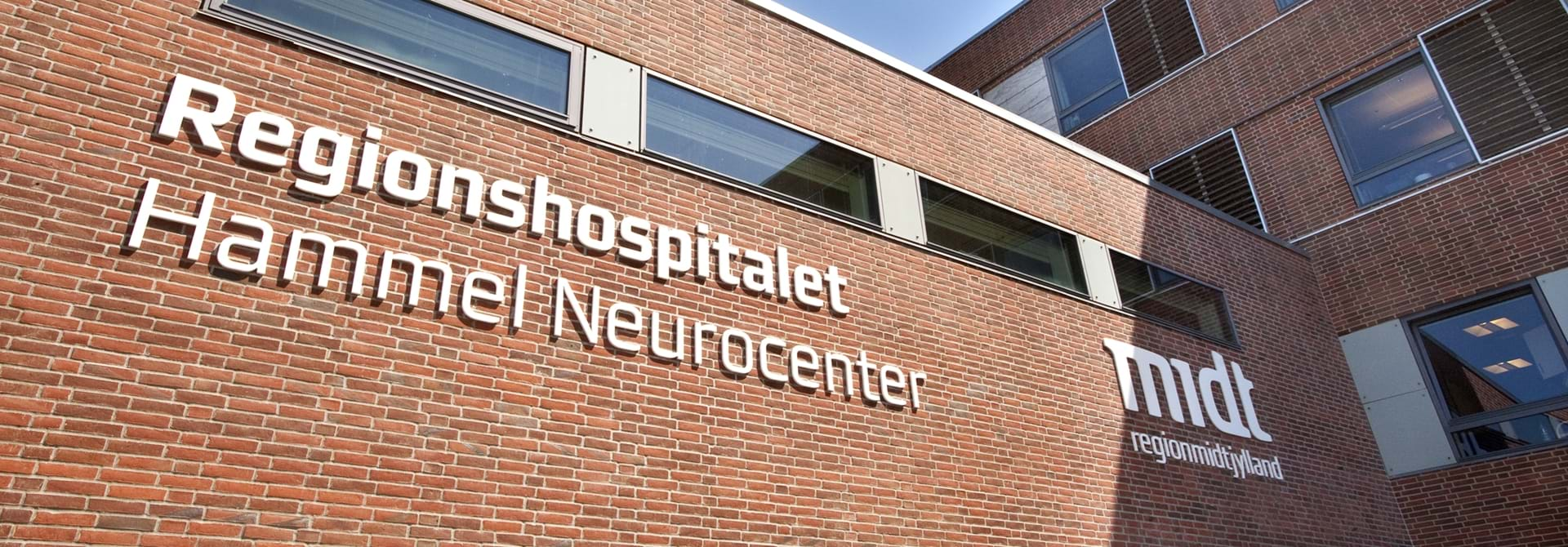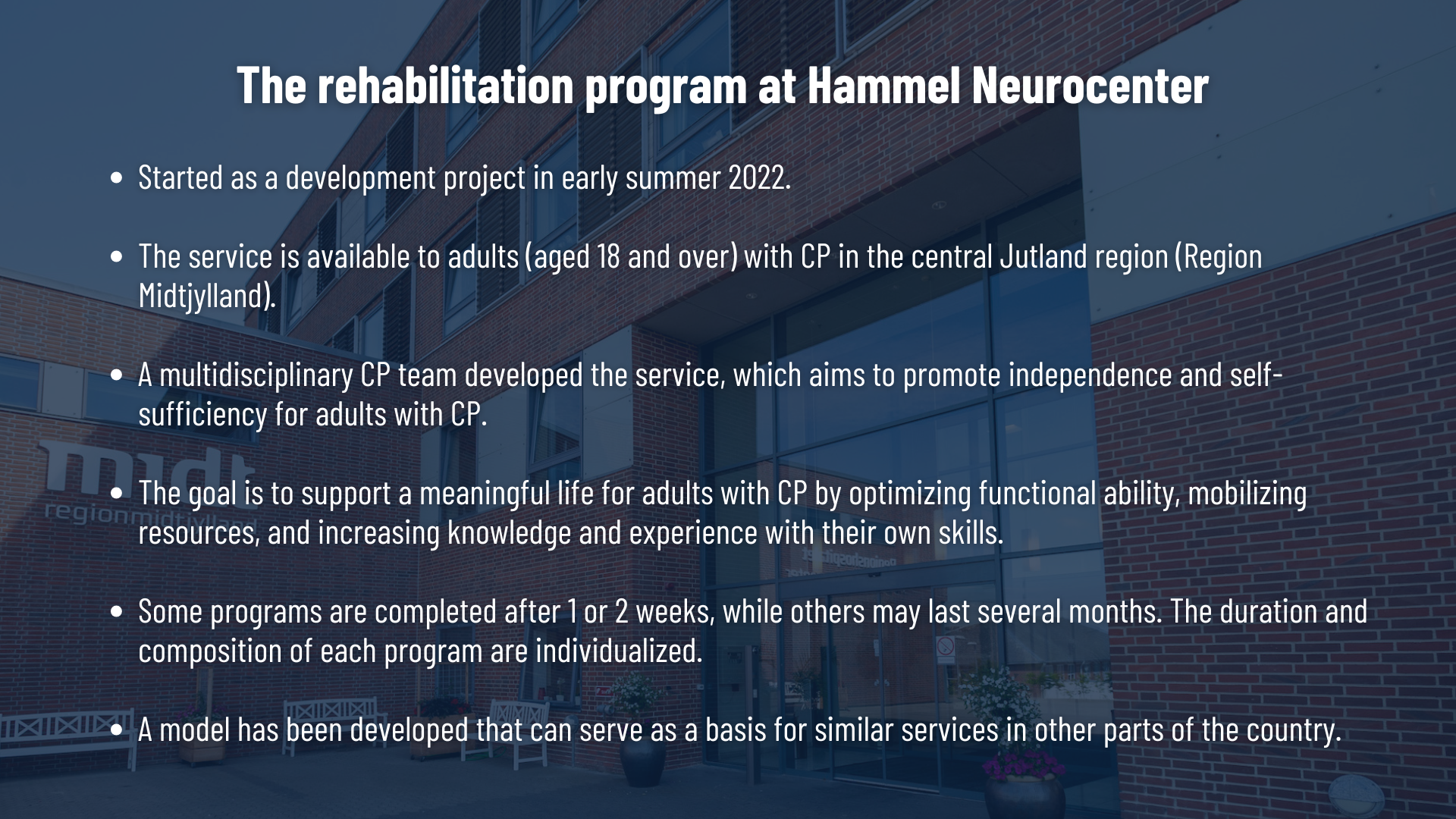Project for adults in Hammel: Outpatient rehabilitation has been an eye-opener
Regional hospital Hammel Neurocenter reflects on the launch of the country’s first rehabilitation program for adults with Cerebral Palsy: There is a need for a coordinated approach, with home rehabilitation as a key element.
“The biggest ‘aha’ moment has been realizing that the most significant progress happens at home and just how much sense that makes,” explains Helene Honoré, Ph.D. and project manager of a rehabilitation initiative for adults with Cerebral Palsy (CP) at Hammel Neurocenter.
Currently, there are no coordinated rehabilitation programs for adults with CP within the public healthcare system. However, thanks to a 30 million DKK donation from the Elsass Foundation, the neurocenter in central Jutland was able to launch the first assessment and treatment programs for this group in the summer of 2022. The initiative is available to adults with CP living in central Jutland (Region Midtjylland), with the ambition of developing a specialized rehabilitation model that can serve as a foundation for similar programs elsewhere in the country.
Tailored programs
The initial plan involved a two-hour introductory visit to the outpatient clinic, with the assumption that most adults with CP would require enrolment for further assessment or training. Before beginning the program, participants were asked to complete a questionnaire about their life with CP, including their functional abilities, fatigue levels, cognitive challenges, and personal goals for the rehabilitation process.
Now, 2.5 years into the project, Honoré reflects on how a fixed plan with outpatient visits and admissions quickly proved unrealistic. The team had to rethink their approach:
“When people meet us at the clinic, they have lived with CP their entire lives. It’s not easy to describe what it’s like to have CP because it’s part of their identity. It can also be difficult to articulate cognitive challenges and how they manifest. We soon realized that we often needed to observe people in familiar surroundings while also considering the fact that many arrive at the clinic already fatigued. That means we don’t get an accurate picture of what they are truly capable of,” explains Honoré.

Occupational therapist and Ph.D. Helene Honoré is the project manager of the rehabilitation project. PHOTO: Agata Lenczewska-Madsen, Hospital Unit Central Jutland.
“It just makes so much sense to see the person in their natural environment, not only because of fatigue, but also because, at the clinic, we can’t observe things like how they get out of their own bed or how they manage everyday tasks, like unloading the dishwasher in their own kitchen.”
As a result, the team restructured the program to begin with a meeting to set expectations with the adult with CP and, if relevant, their caregivers or relatives. To accommodate the fatigue that affects many people with CP, some of these meetings are held virtually. Based on the meeting, an individualized plan is created, tailored to the person’s specific needs. In some cases, this includes a home visit from specialists.
“It just makes so much sense to see the person in their natural environment, not only because of fatigue, but also because, at the clinic, we can’t observe things like how they get out of their own bed or how they manage everyday tasks, like unloading the dishwasher in their own kitchen,” says Honoré.
Outpatient rehabilitation is not normally a widely used approach in specialized hospital settings. But according to Honoré, the donation from the Elsass Foundation has made it possible to think outside the box:
“Instead of being told to create a program that fits into an existing framework, we were asked to identify what is actually needed to provide the best possible support for adults with CP. This gave us both financial and professional freedom - and most importantly, it has been a huge benefit for the participants,” says Honoré.
A welcome initiative
One of the participants is 62-year-old Ellen Ric-Hansen from Aarhus, who had a home visit as part of her program. Over the past 10-15 years, she has noticed increasing physical difficulties. Her balance has worsened, and she has had frequent and serious falls. When her doctor offered her the opportunity to join the new rehabilitation program, Ellen was thrilled.
“I had long felt that there was no support available for people at my stage in life. When I heard about this program, I was overjoyed because there is hardly anywhere left to turn for specialized help and knowledge about CP. There has been a real need for a tailored program that takes a holistic view of life and daily challenges with CP,” says Ellen.
Her journey began with an initial consultation involving a senior physician, nurse, occupational therapist, and physiotherapist, who conducted a thorough assessment and developed a plan for her program.

The interdisciplinary CP team at the regional hospital Hammel Neurocenter includes doctors, nurses, neuropsychologists, occupational therapists, physiotherapists, and speech therapists. PHOTO: Agata Lenczewska-Madsen, Hospital Unit Central Jutland.
“It was absolutely incredible to meet a team that had already familiarized themselves with my case and had such extensive knowledge and understanding of CP. They were familiar with everything I was describing. I had never had that kind of attention before, and I really hope this program becomes permanent so that all adults with CP have a specialized place to turn to,” Ellen shares.
This is rehabilitation!
According to Honoré, it has been interesting to see that most participants in the program realize that their actual needs differ from what they initially state in their questionnaire. Often, they mention the same types of issues they have received help with in the traditional healthcare system. Honoré explains:
“For example, someone might say they want to improve their balance so they can walk to visit friends without using a walking frame. But if using a mobility aid means they can visit their friends more often, then why is the goal to get rid of it?” She continues:
“Many people with CP have internalized the idea that using assistive devices means they are less capable. We work on helping them accept and gain insight into what CP means for them personally and what they need to engage in meaningful activities. And that is rehabilitation.”
A new perspective on CP
For Ellen, the Neurocenter program has also changed her own understanding of life with CP.
“For many years, I compared myself to others and felt like I had to do everything extra well because I have CP. This might have caused some setbacks that didn’t need to happen. At Hammel, I didn’t have to explain myself - they already understood fatigue and the assistive devices that can make life easier. They saw me as a whole person, not just an arm or a leg,” Ellen says.
"At Hammel, I didn’t have to explain myself - they already understood fatigue and the assistive devices that can make life easier. They saw me as a whole person, not just an arm or a leg."

Ellen Ric-Hansen from Aarhus participated in the rehabilitation program in Hammel last fall. PHOTO: Helene Honoré
According to Honoré, a key part of the program’s approach to adults with CP is shifting negative self-perceptions into positive ones.
“We help participants create a new narrative where they are not a burden to society and where they are not lazy or less capable than others. We focus on the perspective that CP creates certain life circumstances, which require, for instance, that your school or job be tailored to fit these, ensuring you have the same conditions as anyone else,” says Honoré.
Tendency for underreporting
Honoré points out that there is a widespread tendency for adults with CP to underreport their issues and symptoms when they visit their GP. Many also face challenges with the structure of the system and feel a need for help that they struggle to access.
“When you only have 10 minutes with your GP, you may not have time to explain everything or clarify what the main issue is. It’s neither the doctor’s nor the patient’s fault. It might also be that you try to get through to the municipality, which may conduct their assessment during a brief visit, not taking into account things like fatigue and changes in functional ability,” says Honoré, adding:
“Sometimes it’s necessary for us to hold a joint meeting with the municipality and, with our comprehensive perspective, explain what we see the person needs. It’s a small effort, but it can make a big difference for someone who has struggled for months or even years to get help.”
Honoré hopes that more GPs will recognize that it’s highly complex to assess people with CP, and that physical challenges are often just a small part of the evaluation.
“If you have hip pain and increasing cognitive difficulties, it might be that you need to reduce your working hours. A pill won’t fix that. What’s important is how the issue plays out in your everyday life,” says Honoré.
One of the goals of the project is to tackle a much-needed task through effective cross-sector collaboration and the involvement of the target group. Based on their experience with the program, the CP team at the neurocenter has developed a clinical model for the rehabilitation of adults with CP, which includes systematic and interdisciplinary assessment. For Honoré, the hope is to expand these thinking and working methods.

In 2021, the Elsass Foundation chose to earmark 30 million DKK for the establishment of the country's first rehabilitation program for adults with CP at regional hospital Hammel Neurocenter. PHOTO: Hospital Unit Central Jutland.
“People with CP need this coordinated, integrated service, but we also believe that if GPs look at this model, it might inspire them to consider whether there are any aspects of a patient’s situation that still need to be assessed to fully understand their needs,” says Honoré.
A small effort with a big impact
Looking back on the project so far, Honoré’s biggest takeaway is that even small interventions can make a huge difference for adults with CP. She is deeply grateful for the donation from the Elsass Foundation, which she believes has made a big difference to the lives of adults with CP.
Ellen has experienced this firsthand. She was given a foot brace (Dictus foot-drop brace), after struggling with dragging her right leg and frequent falls.
“Everyone had told me a Dictus brace wouldn’t help, but at Hammel, they said, ‘Let’s try it out.’ It has been really fantastic, so I wear it all the time now, and it has made my daily life so much easier,” says Ellen.
The Hammel team also assessed Ellen’s home setup and daily activities and discovered among other things that she was struggling to get out of bed.
“They helped me with something as simple as a sliding sheet. It’s such a small thing, yet it has made a huge difference in my daily life. I’ve received tools that I can actually use at home, and that’s priceless,” says Ellen.

